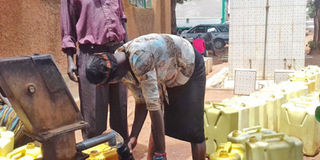Alebtong women save Shs500 weekly to maintain boreholes

A woman fetches water from a borehole in Layibi Division, Gulu Municipality. PHOTO BY JULUIS OCUNGI
Alebtong- Every week, women in Yikwii Village, Omoro Sub-county in Alebtong District gather under a mango tree to set aside money to repair their borehole.
Each member of the group saves Shs500 weekly to maintain the only water source constructed for the community about two years ago. So far, Shs400,000 has been saved since 2015.
Omoro is one of the vulnerable communities in northern Uganda because of the prolonged conflict perpetrated by the Lord’s Resistance Army (LRA) rebels.
After the two-decade insurgency, the community returned from internally displaced people’s camps eight years ago and found that many water sources were destroyed; with coverage standing at only 10 per cent.
About 98 per cent of the diseases diagnosed at health centres during that period were water, sanitation and hygiene (WASH) related. Diarrhoea and typhoid were common illnesses.
However, with continued sensitisation, the situation is different today for the community of more than 43,000 people.
At least 18 local hand pump mechanics have been trained and deployed in each parish to repair the wells.
Currently, a preventive maintenance module is being tested, where the pump mechanics visit each water source per month and do minor repairs for free while major ones are done at an affordable cost.
This measure is timely due to the growing pressure on water resources from population, climate change, pollution and other challenges.
In northern Uganda, drought is exacerbating the large and growing gap between the country’s water use and the available water supply.
The parish chief of Abukamola in Omoro Sub-county, Mr Tonny Isaac Aliro, says 26 villages in his parish lack access to clean water.
“To date, some of these villages are still struggling to access water,” he says.
The Omoro LC3 councillor, Mr Bosco Omenge, says the worst affected villages are Baropiro, Oyere, Oumu A and Oumu B.
The LC3 chairperson, Mr Robert Okullo, says the situation has improved after several development partners such has Divine Waters Uganda and Ryans Well Foundation constructed boreholes in the sub-county.
For 64-year-old Jenti Akullo, a resident of Yikwii, the assistance comes as a relief.
“We used to trek long distances in search of water because we did not have any source within our area,” she says, adding that a borehole constructed in the area by Ryans Well Foundation in 2015 created unity among the people.
Ms Akullo appeals to the government to provide them with agricultural inputs such as hoes and oxen.
Ms Geto Ocekikot, another resident, says: “I had waist pain and I could not trek long distances to fetch water but the borehole constructed in our village has relieved us.”
Mr Martin Olike, the Yikwii Village chairperson, says residents who do not contribute money to the borehole maintenance are blocked from accessing the water point. However, the district vice chairperson, Mr Angelo Okello, says nobody should be denied access to water because they cannot contribute the money.
Mr Edwin Odur, the Divine Waters Uganda’s programme manager, says they have constructed 11 boreholes in Abukamola Parish since 2013.
“We have worked together with them (the community), they have supported our intervention and they have received all that we did for them,” Mr Odur says.
“My request now is for them to sustain it so that they [boreholes] are used for generations because those investments are huge and we believe that we have transformed their lives. We expect them to continue using the facilities for over 50 years,” he adds.
According to Mr Odur, the NGO conducted a research last year and found that only 10 per cent of WASH related infections were registered in health centres in the sub-county.
Water situation
Accessibility: Uganda is one of the 45 developing countries facing chronic under-funding for water, sanitation and hygiene services. In Uganda, 31 per cent of households do not have access to clean water and 19 per cent do not have access to sanitation.
Global goals: The 17 global goals set by United Nations on sustainable development aim to tackle extreme poverty, inequalities and climate change, including the water and sanitation crisis which kills half a million children each year from preventable diarrhoeal diseases.
However, majority have failed to meet their own national commitment targets with 83 per cent and 70 per cent of countries falling significantly behind the trends required to meet their defined national access targets for sanitation and drinking-water, respectively (UN-Water, 2012).
The inclusion of Global Goal 6, which commits UN member states to deliver basic access to water, sanitation and hygiene to everyone, everywhere by 2030, is a victory for more than 10 million people in Uganda today who cannot easily access clean water for domestic use and six million people without access to a secure, private toilet facility.
[email protected]




